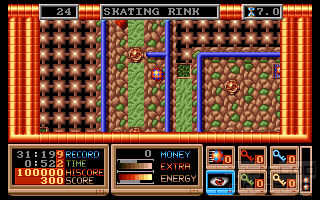What makes a role-playing game? If you thought character stats and progression, you've just described Alter Ego. Though if you considered role-playing in the game genre sense, you would have a completely false impression. There are no elves and dwarves, no blasters, no monsters to fight, no magic rings to recover. Just a regular life to live. Boring? Well, isn't human nature itself the biggest riddle of them all?
The approach the game takes, the question it seems to ask is: what is it that makes a human being the way they are? What makes them behave the way they do? What imprints itself on their personality, leading to what typical traits? When do they behave “rationally”, i.e. based on the conscious weighing of factors, when emotionally? Is there even a difference? Alter Ego follows the model of imprinting a character with some fundamental traits and then forming it through life decisions, beyond their short-term effect.

The most radical thing about it is not even its ambition, but rather the choices of what it does not allow for. Specifically, the game is completely unconcerned with players making a career, a living, becoming famous etc. Departing this far from the wish-fulfilment fantasies usually found in games of the time, this was a brave move for sure. It is not, at all, the predecessor of the yuppie sim Jones in the Fast Lane.
Rather, some unchangeable fundamental framing is simply set. The life to be lived throughout the game is essentially one typically associated with the middle-class suburban class of North America. As someone having been socialised in Western Europe, it can therefore be considered “close enough”. Other cultures, other social situations are not considered. It makes sense, anything else would have exploded complexity.
Based on the seven ages of man, the game describes what it considers typical life situations and asks its player to make appropriate choices. Those then feed into character traits, such as “intelligence” or “physical”. The player can choose which areas of life to focus on. Indeed, one can go through life just repeatedly selecting situations from the “love life” category. There is also one for career/job, but selecting this will also just focus on the social side of it.

Behind the scenes, there is not much of a simulation going on. Rather, the game can be described as a glorified branching scheme with some transversal jump points. Therefore, where all this gets interesting is when current situations presented become influenced by previous choices made. Meaning based on previous choices, the current ones will lead to different outcomes. Playing the game, there is the distinct impression that a strong consistency of life choices is rewarded, whereas playing a jumpy personality leads to problems coming up frequently.
All this does implicitly communicate a large amount of prejudice and rather conservative view on society and our life within. Based on the situations the game presents at all, the choices it allows for and even explicitly when it suddenly starts lecturing its player on having made “bad” decisions. The latter leaving an occasional sour taste especially during adulthood phases, when the narrator's wagging finger strikes a bit too hard.
The same style the game exhibits is rather strong in its early phases, on the other hand. Assuming players to be adults, there is the significant risk that they will make choices reflecting their real-world knowledge and experience even in the early stages. When at the very beginning, as a newborn baby, adult players simply choose to remain quiet while giant faces come threateningly close, making weird sounds etc., the game reminding that this is not what a real baby would feel at that moment, and the way it words this in a lighthearted manner, is actually a great reminder that playing this with a strong level of immersion may be much more beneficial than overthinking it.

Does all this stand a scientific evaluation? For sure not. For that, there are just way too many assumptions made. About scope and frame of the life story told, about society and its expectations. Being written by a man, there is obvious gender prejudice. Although a dedicated female variant has been released, it leaves the impression of the situations in there simply being derived from the male version. The equivalent scenes sometimes just being even more superficial.
Yet, accepting all that, it is strangely compelling to dive into a “what if” scenario on the shallow level of a Hollywood drama movie coming out of a major studio. Certainly, there was nothing to compare it against in the mid-1980s. Even since then, there is preciously little in this field. It's not a scientific study, it's maybe not even a game in the classic sense, but it is an entertaining toy in a field where it shouldn't be as lonely as it is. There is a lot to criticise, about the approach, about the execution, but I'm glad it was made.


Comments (1) [Post comment]